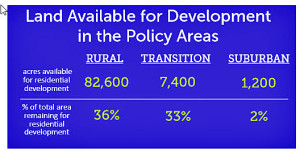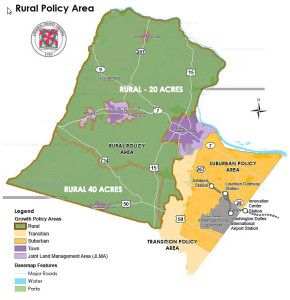Loudoun County, self-described as one of the richest and most splendid counties in America, has set upon producing a “new” comprehensive plan, titled, “Envision Loudoun,” and, to that end, sought to obtain the opinions of the community in what were called, “listening and learning sessions,” to determine what that plan should look like for the County including its rural area.
David Truman, a political scientist, wrote that public hearings and input sessions may be to inform the governing body or they may just be methods to expel political energy while disregarding the will of the people.
Focusing on Western Loudoun, the comments from listening, learning and postings in this ongoing process include thousands of published comments (in small 10 pica type) to preserve Western Loudoun and to stop the development that is underway; this is a sample of the comments:
- “Stop the urban sprawl and protect Western Loudoun.”
- “Maintain two distinct areas, rural west, urban east.”
- “Keep the West rural.”
- “Stop growth.”
- “Contributing to this is the county caving in to developers’ desires…”
- “Economic development should not be a higher purpose than livability – property rights matter.”
- “Rural roads should be left unpaved. If people move to the rural area it should be for the aesthetics of the area.”
- “Protect culture of western Loudoun established over last 250 years.”
- “Protect stone fences throughout western Loudoun, along historic roadways in western Loudoun County, e.g., Beaverdam Creek Historic Roadway.”
- “Maintain open spaces.”
- “Preserve current agriculture [and] farms.”
- “Historic villages aren’t meant to support traffic.”
- “No big box stores [in] Western Loudoun.”
- “Love Western Loudoun as it is, keep open space, horse farms, fight development pressure/housing development.”
- “Stop the residential development.”
At the same time, the public’s opinions were released, there was a separate “Foundation Report” that purported to represent the findings of the “listening” and “learning.”
It described how “Loudoun County has evolved from a collection of rural villages” and from when it was “primarily an agricultural community.”
Rather than cite the will of the residents in the County, and in Western Loudoun, the Report says there is a “growing market demand for new types of development and community amenities.”
Conceding there had been “exponential growth” in the County, the Report contemplates even more. Claiming “an indication of a changing market” and “potentially community preferences,” this suggested, according to the authors of the Report, “the timeliness of the potential for reevaluation inherent in the Envision Loudoun process.”
The Report said that the Loudoun County staff had conducted analyses that “reveal that much of Loudoun County’s residential land, particularly land in the Suburban and Transition Policy areas, is either developed or is considered ‘in the pipeline’ with some level of development approvals.”
The Report then took aim at the rural lands of Western Loudoun, “the remaining uncommitted or underdeveloped residential land that could be developed in the future is approximately 1/3 of available land in the Rural and Transition areas …”
Western Loudoun’s Rural land, as envisioned in the Report, represents an inventory of land “available for development” of 82,600 acres.
 The Report projects that “[b]y the year 2045, … the County will have 175,405 housing units, up nearly 50,000 from 126,468 in 2015.”
The Report projects that “[b]y the year 2045, … the County will have 175,405 housing units, up nearly 50,000 from 126,468 in 2015.”
The Report ignores one constraint identified by former Senator Charles Waddell who said, somewhat prophetically in 1984, taking into account the water resources west of Route 15, that “the West won’t be developed as the East has been unless and until there is public water.”
The Report criticizes the adequacy of the “small [water] systems serving towns and subdivisions, and private systems with individual wells and sewage disposal systems.”
The Report does not consider, however, the effect exponential development would have on the existing water systems, as it most certainly would exceed the capacity of groundwater to sustain this proposed development.
The Report cites the methods used by Loudoun Water east of Route 15 to supply water to its customers, but does not explore how downstream governmental units drawing water from the Potomac would greet this proposal. Nor is there any discussion where the pumping and waste water stations would be located, and what the citizens would think about having their fields excavated for water pipes, and then paying for water that is now available for free from their wells.
As this Report’s trajectory is at odds with the collected “listenings,” we may ask whether we should expect raised pitchforks and a renewed cry from the West to secede from the County.
(You can review the reports in full at the The Loudoun County Preservation and Conservation Coalition (LCPCC) web site.

